Research Plan: Accountants and Auditors' Corporate Governance Role
VerifiedAdded on 2022/10/09
|5
|1322
|356
Homework Assignment
AI Summary
This research plan examines the role of accountants and auditors in corporate governance. It investigates their responsibilities and contributions to fairness and transparency within organizations, focusing on how auditors protect shareholder interests and ensure accurate financial reporting. The plan outlines research objectives, including understanding the conceptual link between auditors and corporate governance, identifying auditor responsibilities, and recommending strategies to enhance their contributions. The study explores ethical considerations and utilizes a literature review with keywords like 'conceptual understanding of auditors and corporate governance' and 'auditors’ responsibilities and contributions toward corporate governance.' The research aims to address questions such as the conceptual understanding of auditors and corporate governance and the strategies to engage auditors effectively. The plan includes references to relevant articles and emphasizes the importance of ethical considerations throughout the research process, highlighting the need for reliable data and adherence to ethical norms to ensure the validity and reliability of the research findings. This document is a valuable resource for students seeking insights into the critical role of auditors in maintaining corporate governance and financial integrity.
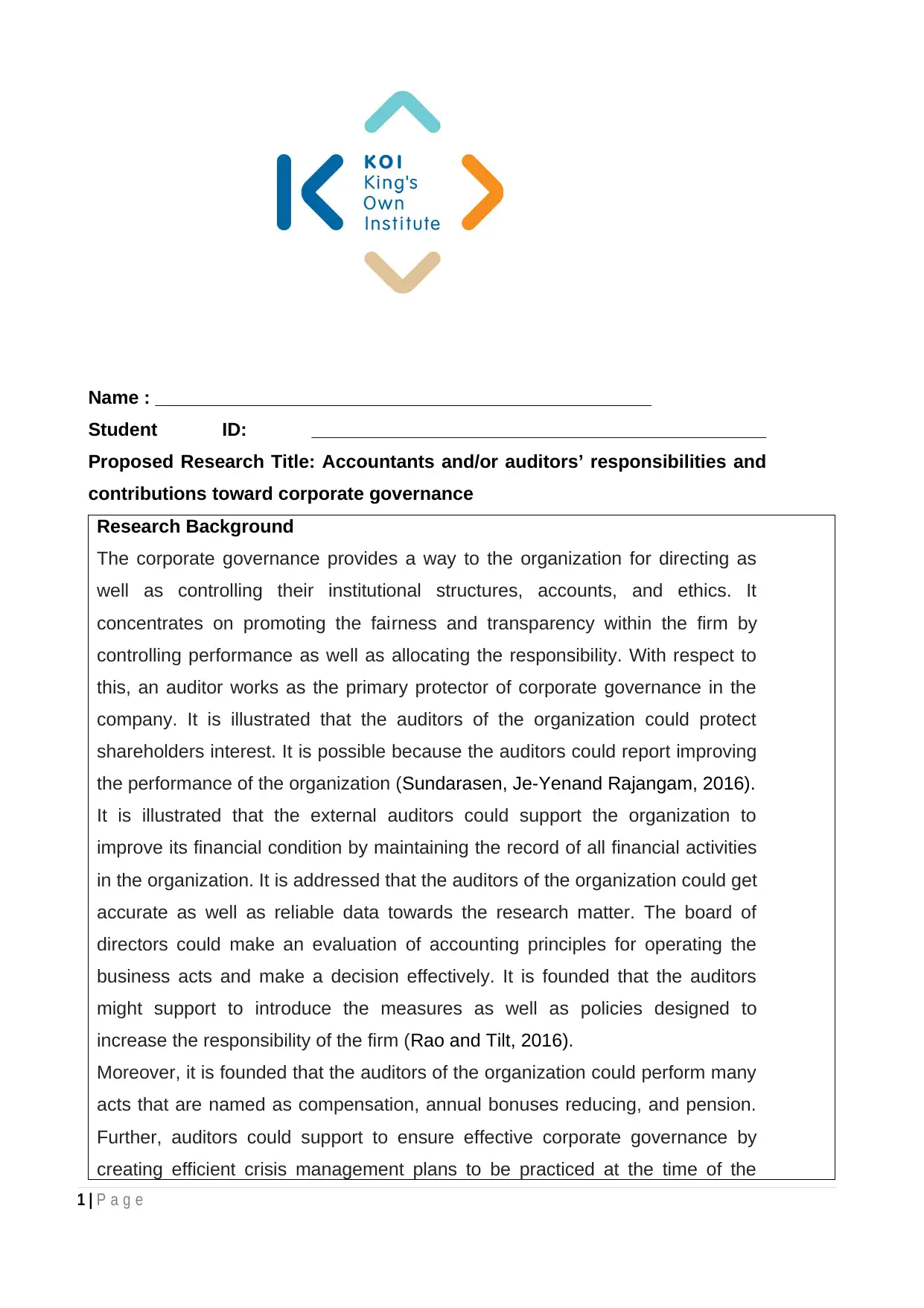
Name : ________________________________________________
Student ID: ____________________________________________
Proposed Research Title: Accountants and/or auditors’ responsibilities and
contributions toward corporate governance
Research Background
The corporate governance provides a way to the organization for directing as
well as controlling their institutional structures, accounts, and ethics. It
concentrates on promoting the fairness and transparency within the firm by
controlling performance as well as allocating the responsibility. With respect to
this, an auditor works as the primary protector of corporate governance in the
company. It is illustrated that the auditors of the organization could protect
shareholders interest. It is possible because the auditors could report improving
the performance of the organization (Sundarasen, Je-Yenand Rajangam, 2016).
It is illustrated that the external auditors could support the organization to
improve its financial condition by maintaining the record of all financial activities
in the organization. It is addressed that the auditors of the organization could get
accurate as well as reliable data towards the research matter. The board of
directors could make an evaluation of accounting principles for operating the
business acts and make a decision effectively. It is founded that the auditors
might support to introduce the measures as well as policies designed to
increase the responsibility of the firm (Rao and Tilt, 2016).
Moreover, it is founded that the auditors of the organization could perform many
acts that are named as compensation, annual bonuses reducing, and pension.
Further, auditors could support to ensure effective corporate governance by
creating efficient crisis management plans to be practiced at the time of the
1 | P a g e
Student ID: ____________________________________________
Proposed Research Title: Accountants and/or auditors’ responsibilities and
contributions toward corporate governance
Research Background
The corporate governance provides a way to the organization for directing as
well as controlling their institutional structures, accounts, and ethics. It
concentrates on promoting the fairness and transparency within the firm by
controlling performance as well as allocating the responsibility. With respect to
this, an auditor works as the primary protector of corporate governance in the
company. It is illustrated that the auditors of the organization could protect
shareholders interest. It is possible because the auditors could report improving
the performance of the organization (Sundarasen, Je-Yenand Rajangam, 2016).
It is illustrated that the external auditors could support the organization to
improve its financial condition by maintaining the record of all financial activities
in the organization. It is addressed that the auditors of the organization could get
accurate as well as reliable data towards the research matter. The board of
directors could make an evaluation of accounting principles for operating the
business acts and make a decision effectively. It is founded that the auditors
might support to introduce the measures as well as policies designed to
increase the responsibility of the firm (Rao and Tilt, 2016).
Moreover, it is founded that the auditors of the organization could perform many
acts that are named as compensation, annual bonuses reducing, and pension.
Further, auditors could support to ensure effective corporate governance by
creating efficient crisis management plans to be practiced at the time of the
1 | P a g e
Paraphrase This Document
Need a fresh take? Get an instant paraphrase of this document with our AI Paraphraser
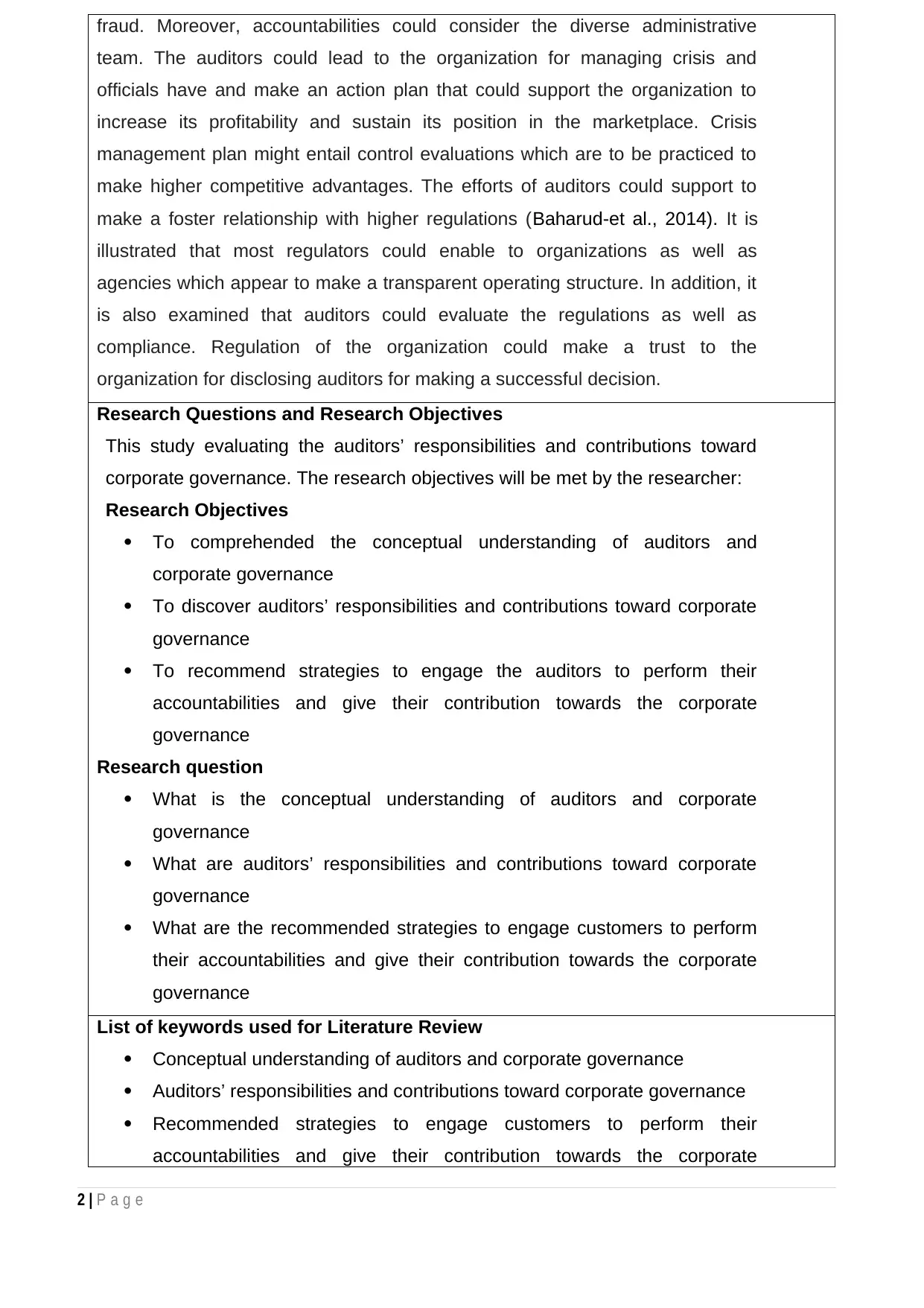
fraud. Moreover, accountabilities could consider the diverse administrative
team. The auditors could lead to the organization for managing crisis and
officials have and make an action plan that could support the organization to
increase its profitability and sustain its position in the marketplace. Crisis
management plan might entail control evaluations which are to be practiced to
make higher competitive advantages. The efforts of auditors could support to
make a foster relationship with higher regulations (Baharud-et al., 2014). It is
illustrated that most regulators could enable to organizations as well as
agencies which appear to make a transparent operating structure. In addition, it
is also examined that auditors could evaluate the regulations as well as
compliance. Regulation of the organization could make a trust to the
organization for disclosing auditors for making a successful decision.
Research Questions and Research Objectives
This study evaluating the auditors’ responsibilities and contributions toward
corporate governance. The research objectives will be met by the researcher:
Research Objectives
To comprehended the conceptual understanding of auditors and
corporate governance
To discover auditors’ responsibilities and contributions toward corporate
governance
To recommend strategies to engage the auditors to perform their
accountabilities and give their contribution towards the corporate
governance
Research question
What is the conceptual understanding of auditors and corporate
governance
What are auditors’ responsibilities and contributions toward corporate
governance
What are the recommended strategies to engage customers to perform
their accountabilities and give their contribution towards the corporate
governance
List of keywords used for Literature Review
Conceptual understanding of auditors and corporate governance
Auditors’ responsibilities and contributions toward corporate governance
Recommended strategies to engage customers to perform their
accountabilities and give their contribution towards the corporate
2 | P a g e
team. The auditors could lead to the organization for managing crisis and
officials have and make an action plan that could support the organization to
increase its profitability and sustain its position in the marketplace. Crisis
management plan might entail control evaluations which are to be practiced to
make higher competitive advantages. The efforts of auditors could support to
make a foster relationship with higher regulations (Baharud-et al., 2014). It is
illustrated that most regulators could enable to organizations as well as
agencies which appear to make a transparent operating structure. In addition, it
is also examined that auditors could evaluate the regulations as well as
compliance. Regulation of the organization could make a trust to the
organization for disclosing auditors for making a successful decision.
Research Questions and Research Objectives
This study evaluating the auditors’ responsibilities and contributions toward
corporate governance. The research objectives will be met by the researcher:
Research Objectives
To comprehended the conceptual understanding of auditors and
corporate governance
To discover auditors’ responsibilities and contributions toward corporate
governance
To recommend strategies to engage the auditors to perform their
accountabilities and give their contribution towards the corporate
governance
Research question
What is the conceptual understanding of auditors and corporate
governance
What are auditors’ responsibilities and contributions toward corporate
governance
What are the recommended strategies to engage customers to perform
their accountabilities and give their contribution towards the corporate
governance
List of keywords used for Literature Review
Conceptual understanding of auditors and corporate governance
Auditors’ responsibilities and contributions toward corporate governance
Recommended strategies to engage customers to perform their
accountabilities and give their contribution towards the corporate
2 | P a g e
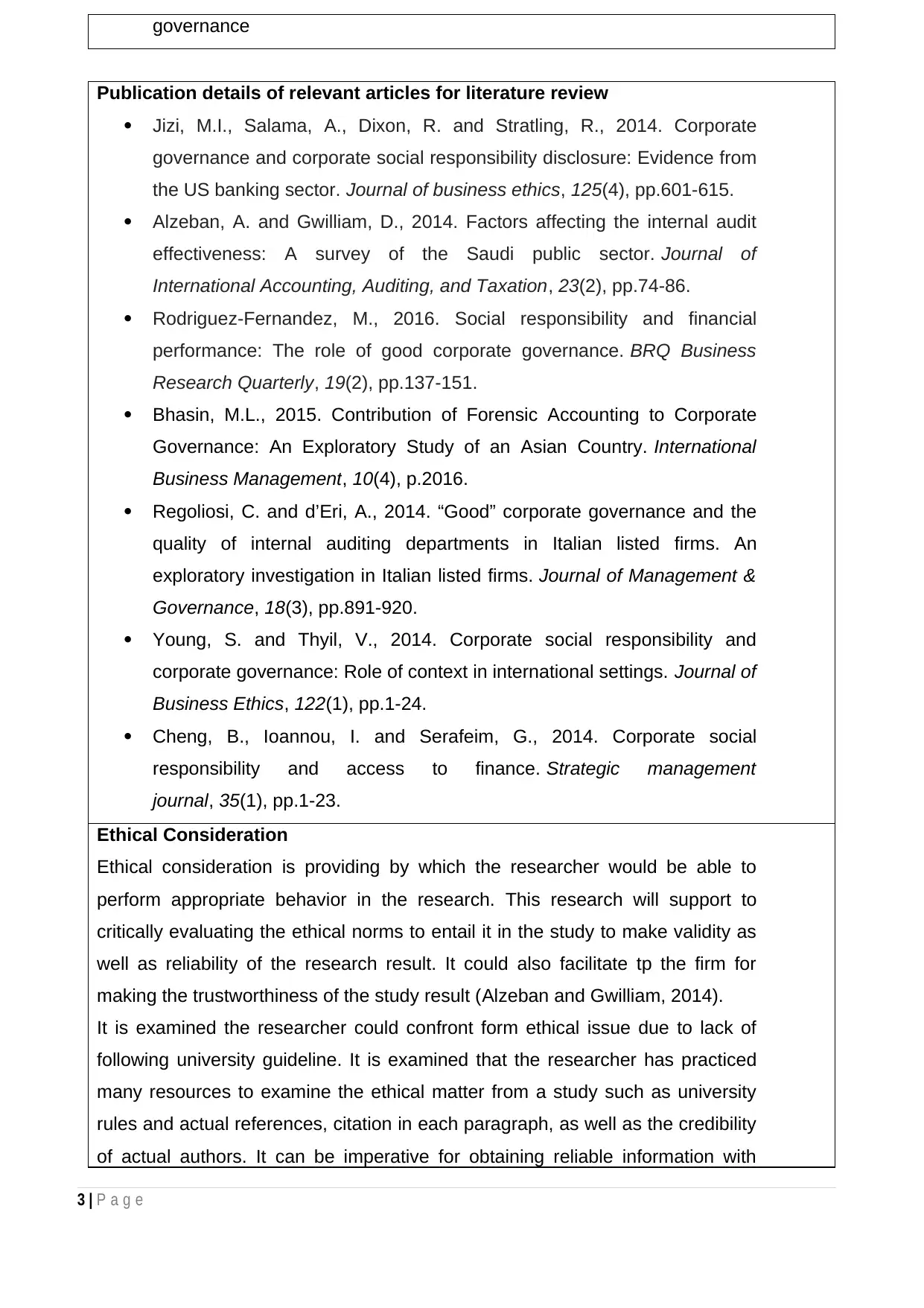
governance
Publication details of relevant articles for literature review
Jizi, M.I., Salama, A., Dixon, R. and Stratling, R., 2014. Corporate
governance and corporate social responsibility disclosure: Evidence from
the US banking sector. Journal of business ethics, 125(4), pp.601-615.
Alzeban, A. and Gwilliam, D., 2014. Factors affecting the internal audit
effectiveness: A survey of the Saudi public sector. Journal of
International Accounting, Auditing, and Taxation, 23(2), pp.74-86.
Rodriguez-Fernandez, M., 2016. Social responsibility and financial
performance: The role of good corporate governance. BRQ Business
Research Quarterly, 19(2), pp.137-151.
Bhasin, M.L., 2015. Contribution of Forensic Accounting to Corporate
Governance: An Exploratory Study of an Asian Country. International
Business Management, 10(4), p.2016.
Regoliosi, C. and d’Eri, A., 2014. “Good” corporate governance and the
quality of internal auditing departments in Italian listed firms. An
exploratory investigation in Italian listed firms. Journal of Management &
Governance, 18(3), pp.891-920.
Young, S. and Thyil, V., 2014. Corporate social responsibility and
corporate governance: Role of context in international settings. Journal of
Business Ethics, 122(1), pp.1-24.
Cheng, B., Ioannou, I. and Serafeim, G., 2014. Corporate social
responsibility and access to finance. Strategic management
journal, 35(1), pp.1-23.
Ethical Consideration
Ethical consideration is providing by which the researcher would be able to
perform appropriate behavior in the research. This research will support to
critically evaluating the ethical norms to entail it in the study to make validity as
well as reliability of the research result. It could also facilitate tp the firm for
making the trustworthiness of the study result (Alzeban and Gwilliam, 2014).
It is examined the researcher could confront form ethical issue due to lack of
following university guideline. It is examined that the researcher has practiced
many resources to examine the ethical matter from a study such as university
rules and actual references, citation in each paragraph, as well as the credibility
of actual authors. It can be imperative for obtaining reliable information with
3 | P a g e
Publication details of relevant articles for literature review
Jizi, M.I., Salama, A., Dixon, R. and Stratling, R., 2014. Corporate
governance and corporate social responsibility disclosure: Evidence from
the US banking sector. Journal of business ethics, 125(4), pp.601-615.
Alzeban, A. and Gwilliam, D., 2014. Factors affecting the internal audit
effectiveness: A survey of the Saudi public sector. Journal of
International Accounting, Auditing, and Taxation, 23(2), pp.74-86.
Rodriguez-Fernandez, M., 2016. Social responsibility and financial
performance: The role of good corporate governance. BRQ Business
Research Quarterly, 19(2), pp.137-151.
Bhasin, M.L., 2015. Contribution of Forensic Accounting to Corporate
Governance: An Exploratory Study of an Asian Country. International
Business Management, 10(4), p.2016.
Regoliosi, C. and d’Eri, A., 2014. “Good” corporate governance and the
quality of internal auditing departments in Italian listed firms. An
exploratory investigation in Italian listed firms. Journal of Management &
Governance, 18(3), pp.891-920.
Young, S. and Thyil, V., 2014. Corporate social responsibility and
corporate governance: Role of context in international settings. Journal of
Business Ethics, 122(1), pp.1-24.
Cheng, B., Ioannou, I. and Serafeim, G., 2014. Corporate social
responsibility and access to finance. Strategic management
journal, 35(1), pp.1-23.
Ethical Consideration
Ethical consideration is providing by which the researcher would be able to
perform appropriate behavior in the research. This research will support to
critically evaluating the ethical norms to entail it in the study to make validity as
well as reliability of the research result. It could also facilitate tp the firm for
making the trustworthiness of the study result (Alzeban and Gwilliam, 2014).
It is examined the researcher could confront form ethical issue due to lack of
following university guideline. It is examined that the researcher has practiced
many resources to examine the ethical matter from a study such as university
rules and actual references, citation in each paragraph, as well as the credibility
of actual authors. It can be imperative for obtaining reliable information with
3 | P a g e
⊘ This is a preview!⊘
Do you want full access?
Subscribe today to unlock all pages.

Trusted by 1+ million students worldwide
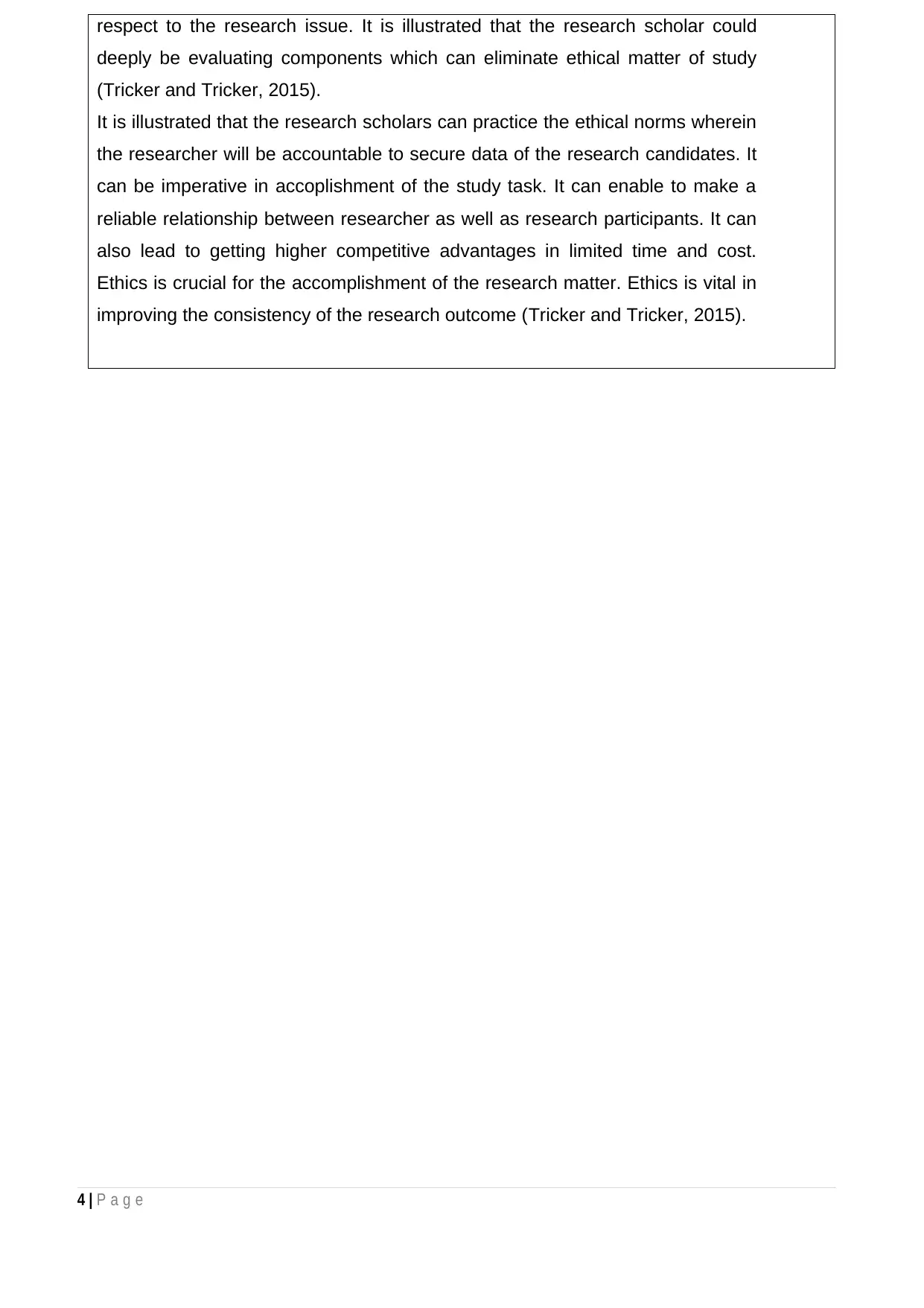
respect to the research issue. It is illustrated that the research scholar could
deeply be evaluating components which can eliminate ethical matter of study
(Tricker and Tricker, 2015).
It is illustrated that the research scholars can practice the ethical norms wherein
the researcher will be accountable to secure data of the research candidates. It
can be imperative in accoplishment of the study task. It can enable to make a
reliable relationship between researcher as well as research participants. It can
also lead to getting higher competitive advantages in limited time and cost.
Ethics is crucial for the accomplishment of the research matter. Ethics is vital in
improving the consistency of the research outcome (Tricker and Tricker, 2015).
4 | P a g e
deeply be evaluating components which can eliminate ethical matter of study
(Tricker and Tricker, 2015).
It is illustrated that the research scholars can practice the ethical norms wherein
the researcher will be accountable to secure data of the research candidates. It
can be imperative in accoplishment of the study task. It can enable to make a
reliable relationship between researcher as well as research participants. It can
also lead to getting higher competitive advantages in limited time and cost.
Ethics is crucial for the accomplishment of the research matter. Ethics is vital in
improving the consistency of the research outcome (Tricker and Tricker, 2015).
4 | P a g e
Paraphrase This Document
Need a fresh take? Get an instant paraphrase of this document with our AI Paraphraser
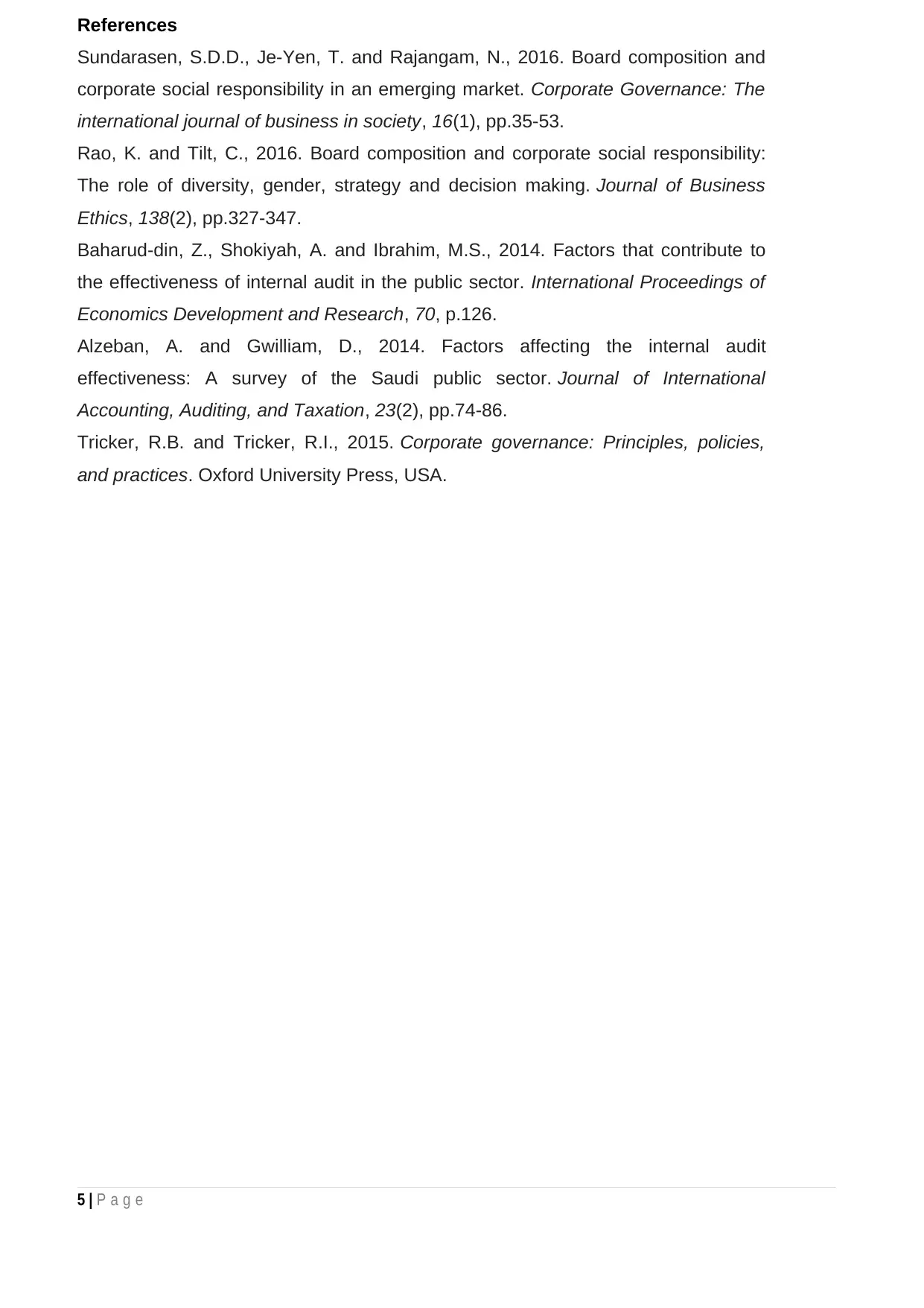
References
Sundarasen, S.D.D., Je-Yen, T. and Rajangam, N., 2016. Board composition and
corporate social responsibility in an emerging market. Corporate Governance: The
international journal of business in society, 16(1), pp.35-53.
Rao, K. and Tilt, C., 2016. Board composition and corporate social responsibility:
The role of diversity, gender, strategy and decision making. Journal of Business
Ethics, 138(2), pp.327-347.
Baharud-din, Z., Shokiyah, A. and Ibrahim, M.S., 2014. Factors that contribute to
the effectiveness of internal audit in the public sector. International Proceedings of
Economics Development and Research, 70, p.126.
Alzeban, A. and Gwilliam, D., 2014. Factors affecting the internal audit
effectiveness: A survey of the Saudi public sector. Journal of International
Accounting, Auditing, and Taxation, 23(2), pp.74-86.
Tricker, R.B. and Tricker, R.I., 2015. Corporate governance: Principles, policies,
and practices. Oxford University Press, USA.
5 | P a g e
Sundarasen, S.D.D., Je-Yen, T. and Rajangam, N., 2016. Board composition and
corporate social responsibility in an emerging market. Corporate Governance: The
international journal of business in society, 16(1), pp.35-53.
Rao, K. and Tilt, C., 2016. Board composition and corporate social responsibility:
The role of diversity, gender, strategy and decision making. Journal of Business
Ethics, 138(2), pp.327-347.
Baharud-din, Z., Shokiyah, A. and Ibrahim, M.S., 2014. Factors that contribute to
the effectiveness of internal audit in the public sector. International Proceedings of
Economics Development and Research, 70, p.126.
Alzeban, A. and Gwilliam, D., 2014. Factors affecting the internal audit
effectiveness: A survey of the Saudi public sector. Journal of International
Accounting, Auditing, and Taxation, 23(2), pp.74-86.
Tricker, R.B. and Tricker, R.I., 2015. Corporate governance: Principles, policies,
and practices. Oxford University Press, USA.
5 | P a g e
1 out of 5
Related Documents
Your All-in-One AI-Powered Toolkit for Academic Success.
+13062052269
info@desklib.com
Available 24*7 on WhatsApp / Email
![[object Object]](/_next/static/media/star-bottom.7253800d.svg)
Unlock your academic potential
Copyright © 2020–2026 A2Z Services. All Rights Reserved. Developed and managed by ZUCOL.





